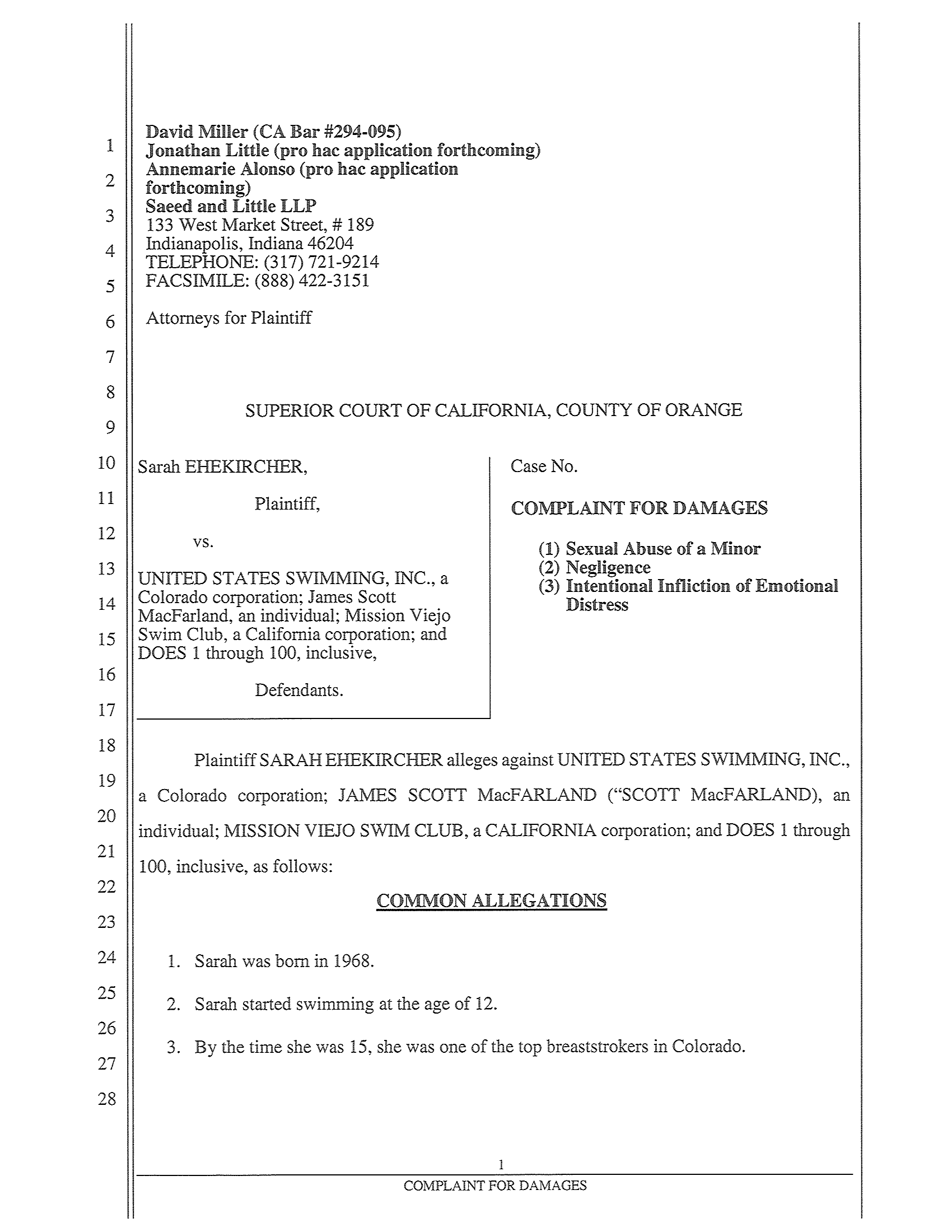Here are some words that at some point I had lost hope that I would be able to type: Sarah Ehekircher is suing USA Swimming, her abuser James Scott MacFarland and Mission Viejo Swim Club. In a filing sent to me by Sarah herself and attached within this post, many of the same details included in hours of podcasts that Sarah and I did together.
If you want to catch up on the story, you can listen to any number or podcasts we did together, with a warning that it is over five hours. Or you can go here if you’d prefer to read.
For those that just came her to hear my thoughts, I’m happy to oblige. There are several pieces of this lawsuit that will force answers to crucial questions around the defendants. I’m very interested in the answers to those questions.
But before I get to that, I have a confession to make. Despite Sarah and I talking frequently and her sharing the details of this story, I have been largely out of contact with her for over a year. Readers of this blog deserve an explanation, lest I represent myself as a dogged supporter of Sarah.
This story is personal to me. It was so personal that at the outset I was scared to engage, scared of what emotions it might arise in me and how it would effect my emotional state. At moments, I have to admit that I got overwhelmed by the injustice in this case.
Even more overwhelming is when I consider that Sarah’s story is not at all unique, that this is just the one that I have heard and personally engaged in. I believe that there are thousands of people who have come through the sport of swimming with experiences similar to Sarah.
I’m really grateful in this moment to be going to work in a place where speaking out on a topic like this is seen as an asset, not a liability. That is sadly not the case many places. For writing about Sarah (and others), and others, I’ve faced retaliation from professional staff within USA Swimming as well as USA Swimming board members and other coaches.
To put it simply, it’s lonely writing about this stuff. It shouldn’t be, but it is. On an individual level, I can’t say I would advise anybody else to do it. You open yourself to a lot of pain. On a group level, as people that love swimming, I believe we have no choice BUT to fight for justice. If we don’t I think our sport will perish.
Ok, with that put aside, here are the big deals contained within the lawsuit:
Did USA Swimming and Mission Viejo Have An Obligation to Intervene?
Sarah first sought justice for her abuse in the wake of USA Swimming’s first “reckoning” in 2010. She felt hope that the outside pressure put on USA Swimming at that time, mostly arising from the blundering of then boss Chuck Wielgus, would mean justice.
Sadly, USA Swimming was and remains structurally unable to intervene to protect young people from abuse. In fact, rather than act to sanction Scott MacFarland (which may have prevented future abuse and brought justice to further victims), I believe that USA Swimming acted to shield themselves through their National Board of Review process.
Mission Viejo Swim Club is one of the most infamous swim clubs in America. At one point in my life I viewed it as swimming’s Camelot, a sun-soaked Southern California dream. But the club has been a nightmare for many who have passed through.
In many ways, the club is emblematic of the culture USA Swimming has fostered among swimming clubs. There are great rewards for “high performance”, and no punishment for employing coaches that view athletes under their care as sexual objects.
Can Scott MacFarland Continue to Coach?
Publicly, Scott MacFarland “retired” in the wake of Sarah’s public accusation against him in 2018. He was at that time working for Magnolia Aquatic Club, in Magnolia, Texas. At the time you could find him on Magnolia’s website. Now upon visiting, I can’t actually find any information about who coaches at Magnolia at all.
While I am hopeful that Scott MacFarland is not coaching, it’s still possible that he is on a pool deck somewhere, protected by “good people” who don’t believe Sarah. Barring any legal judgment, I don’t expect that the toothless Center for Safesport will find the will to bar MacFarland from coaching.
In the meantime, Magnolia Aquatic Club had another coach banned (and later un-banned) and gained USA Swimming Safe Sport Recognition. According to Magnolia, USA Swimming grants their seal of Safe Sportedness based on the following criteria:
Our travel, electronic communication, and anti-bullying policies;
Our team honor codes and codes of conduct;
The processes by which we recruit and train staff;
Our communication procedures;
And our efforts to educate about Safe Sport, abuse prevention, and healthy boundaries.
What Will Mark Schubert’s Legacy Be?
The readers of this blog know what I think of Mark Schubert, who once again finds himself entangled in a legal battle over his (lacking) leadership over the years.
Still there remains a large portion of my coaching colleagues who still regard Schubert as a “legend”. Another segment is simply put, afraid. They are waiting for someone else to figuratively punch the big bully in the mouth.
Each case represents the battle over this legacy, which is about a lot more than just Schubert. Schubert has never operated in a vacuum. His influence extends to, at minimum, hundreds of coaches within the United States. A sanction of his leadership would be, in my opinion, a fork in the road in a battle for what is right in coaching.
Although I said this was lonely, that’s also my own pessimism talking. Right now i see a generational battle in the coaching world. Most of the coaches under 40 that I meet don’t have any ambiguous feelings about what is the right and professional way to conduct a coach-athlete relationship. Plenty of older coaches know too.
Some day I hope we’ll look back at the Mark Schubert era of swim coaching as the dark ages, a time period when many coaches got rewarded for doing awful things while others were punished for doing the right thing, but that eventually, through will, we righted the ship.


